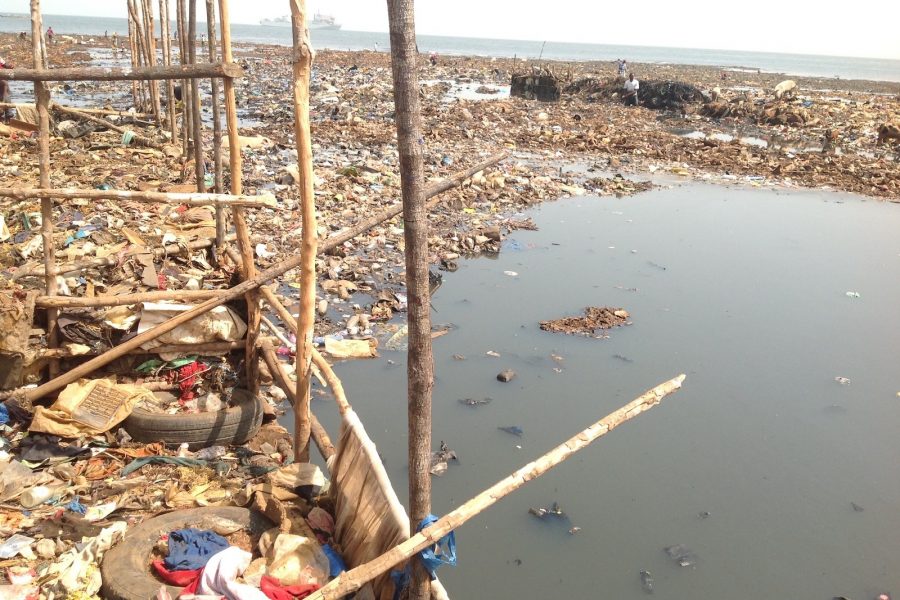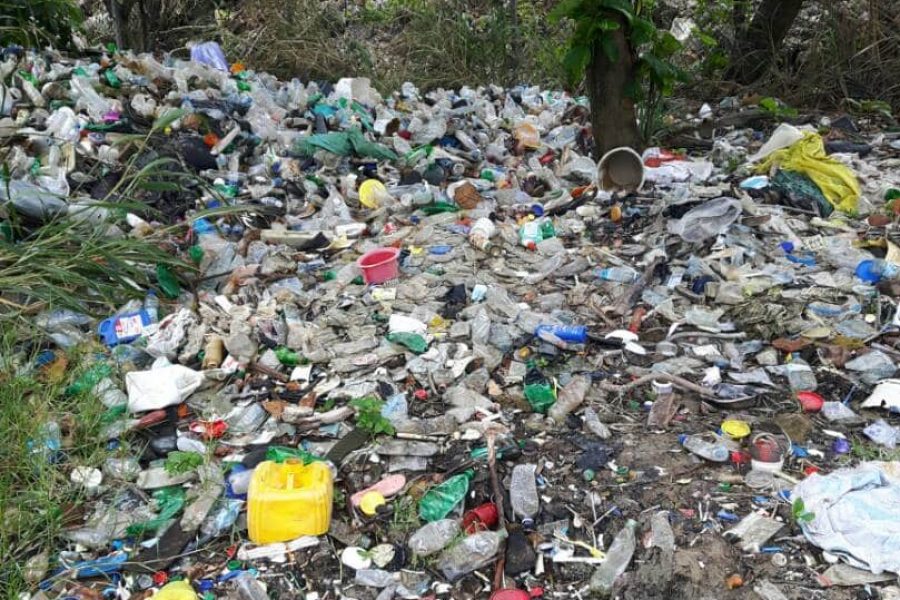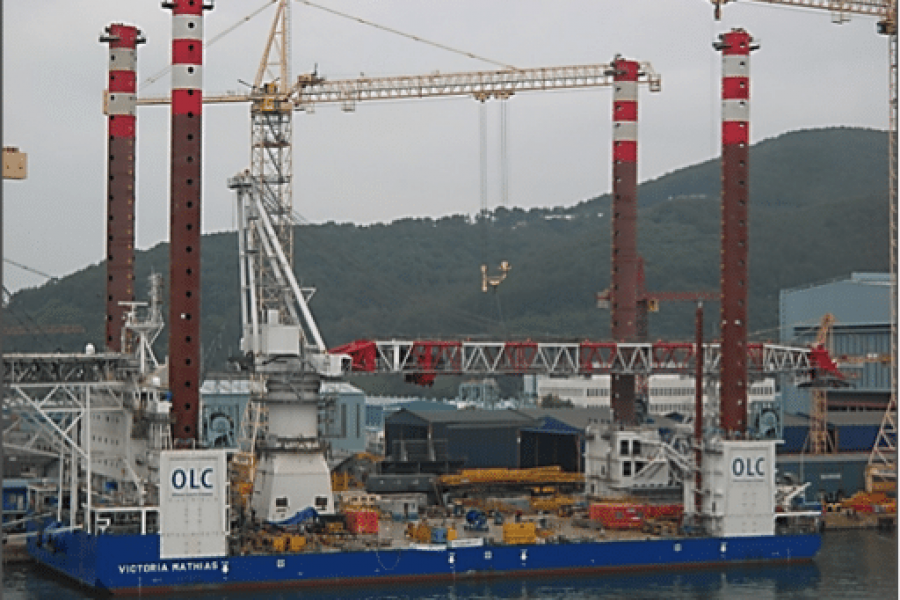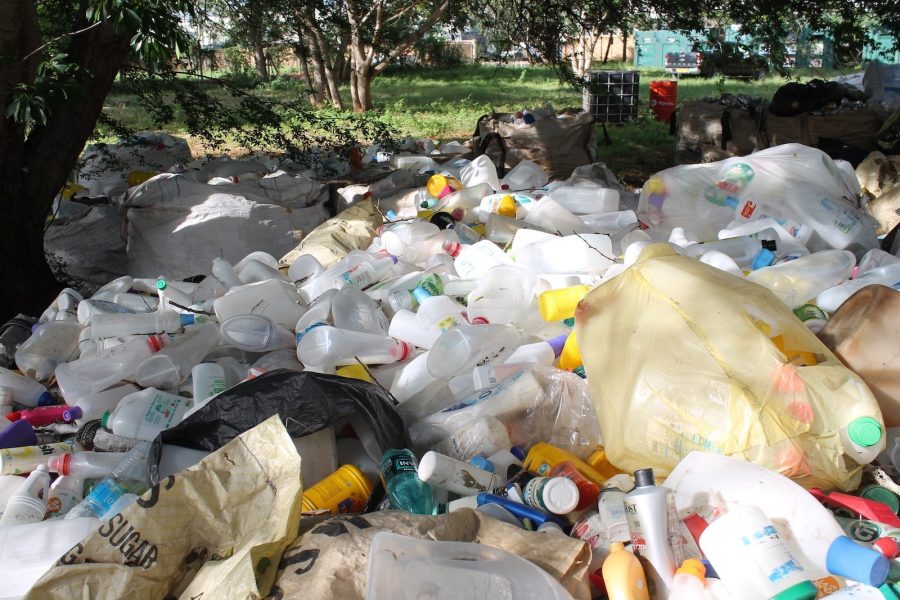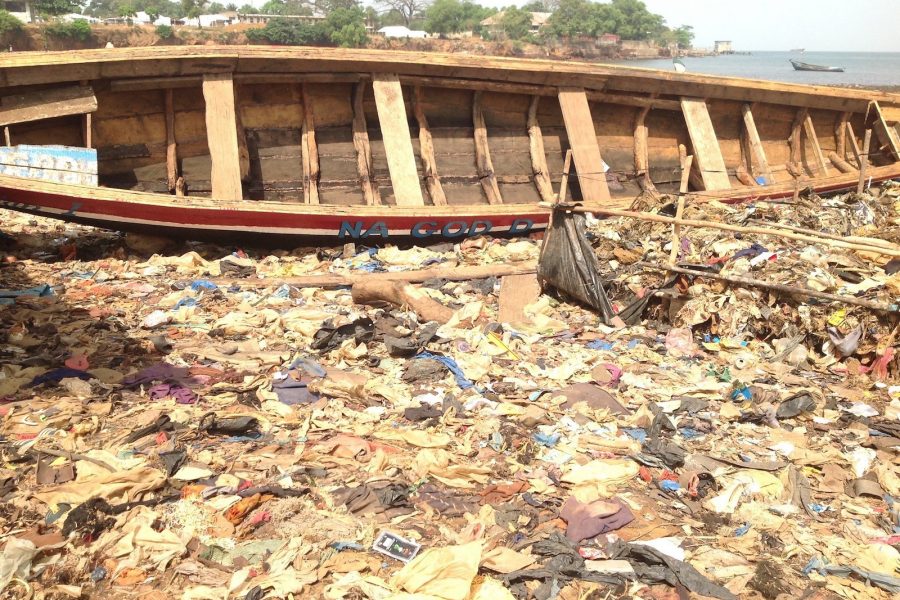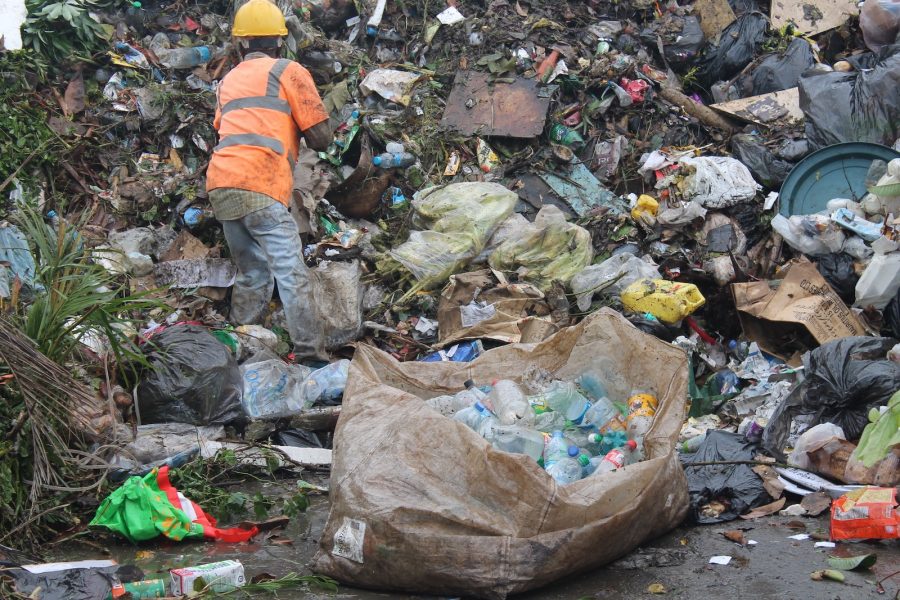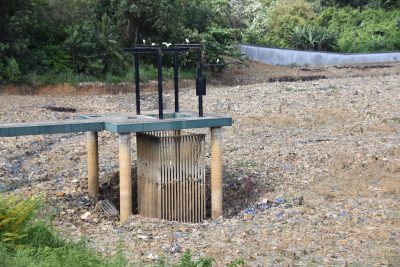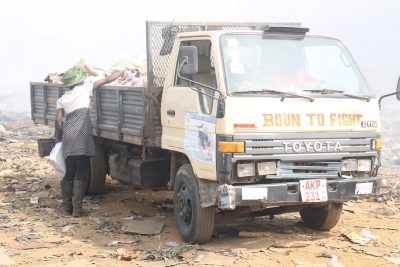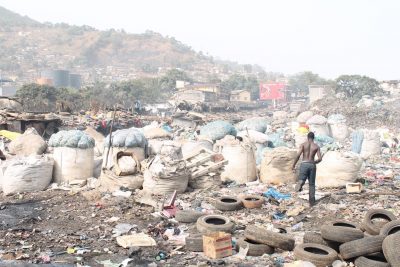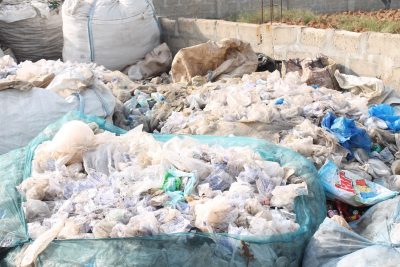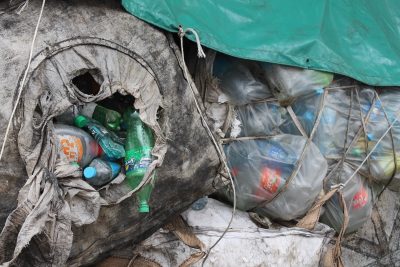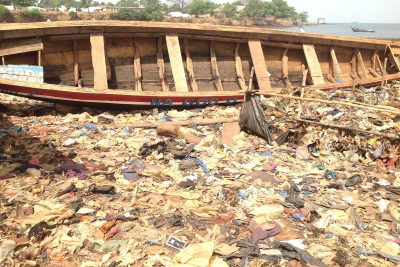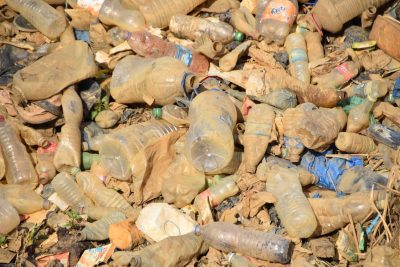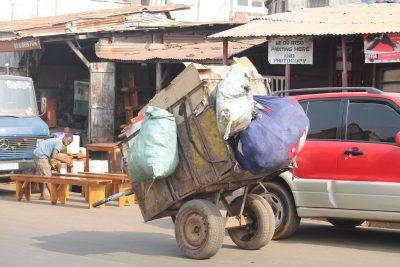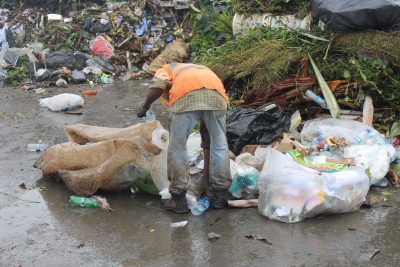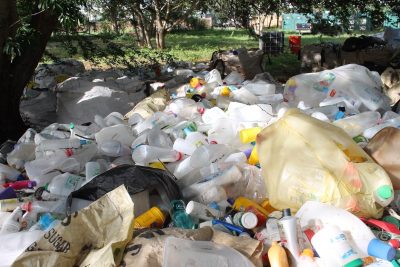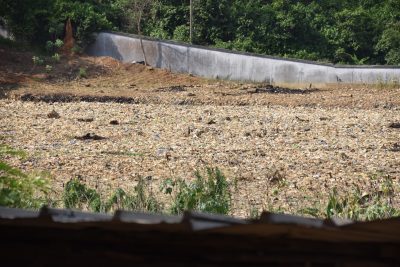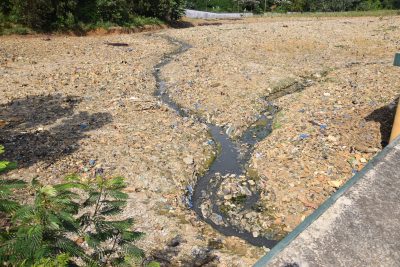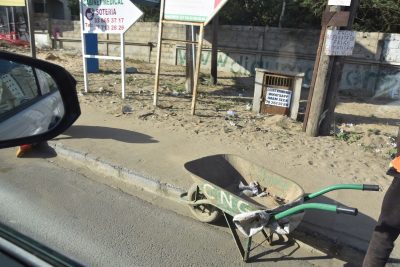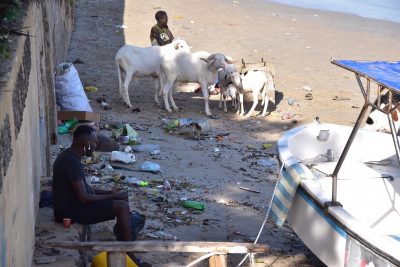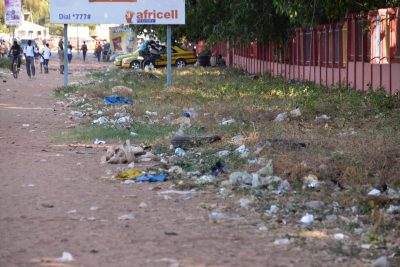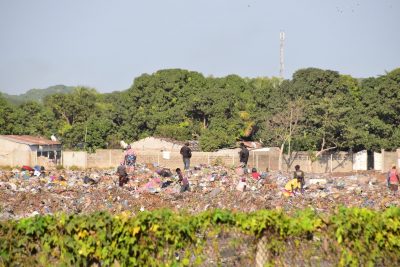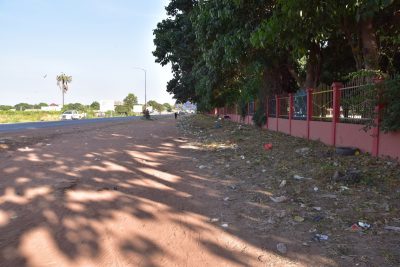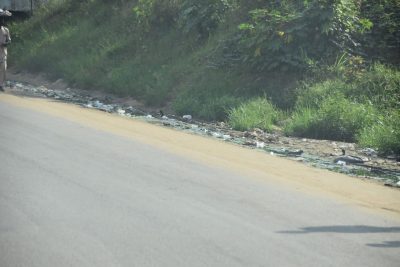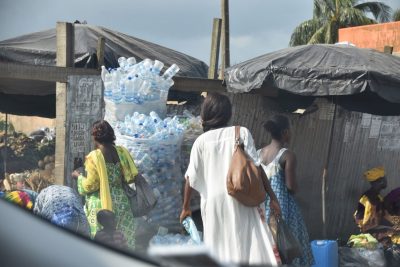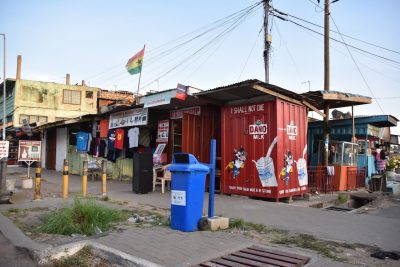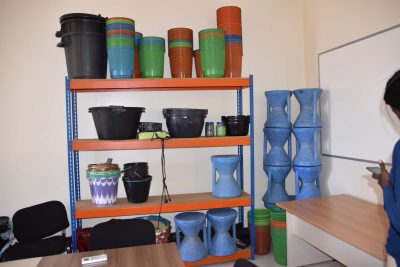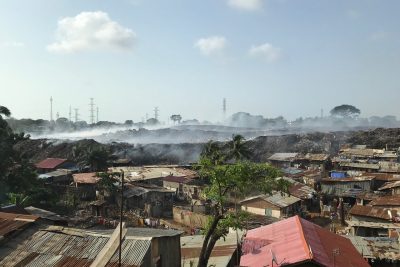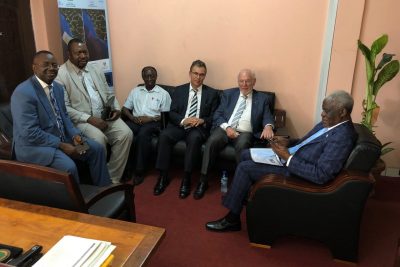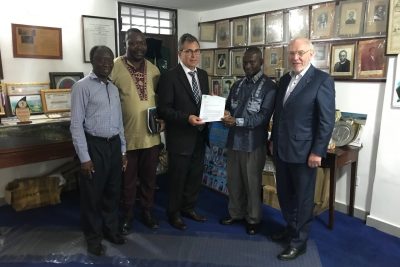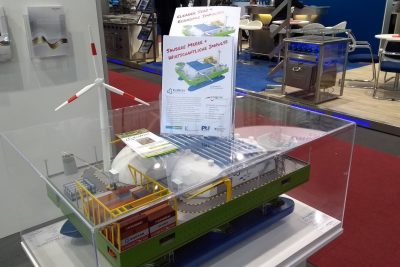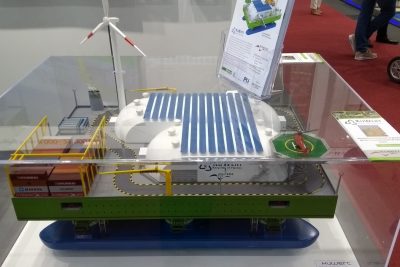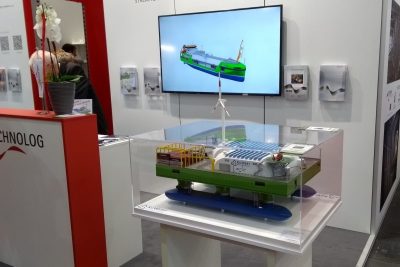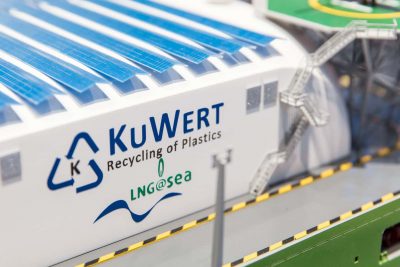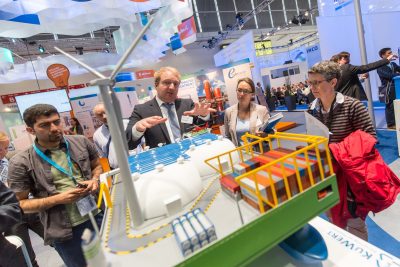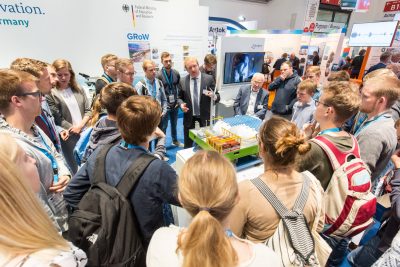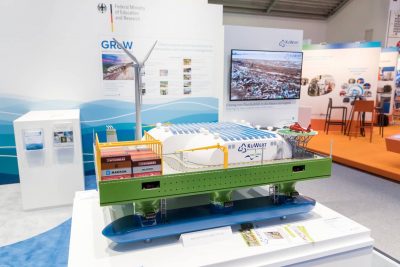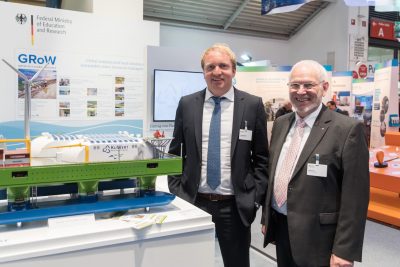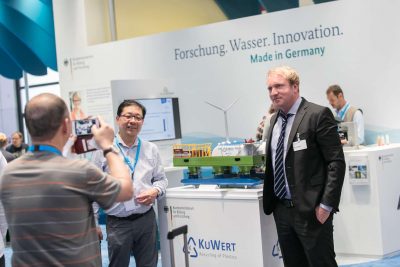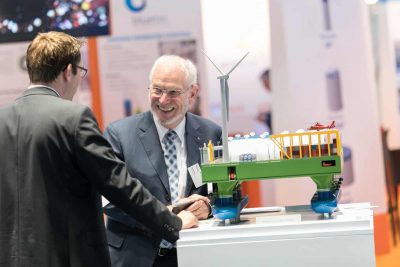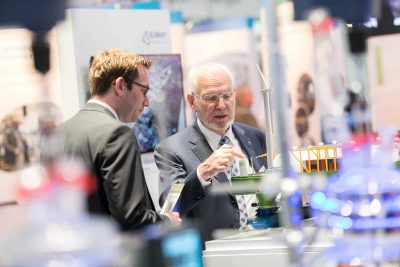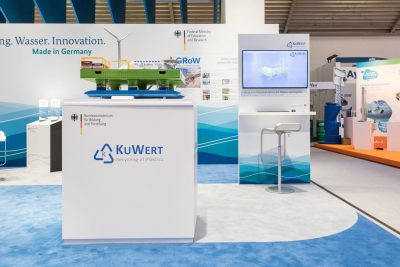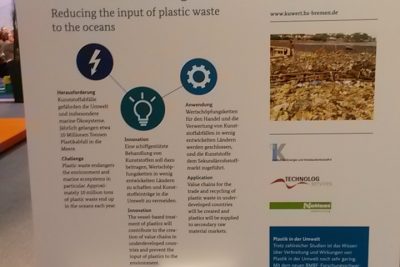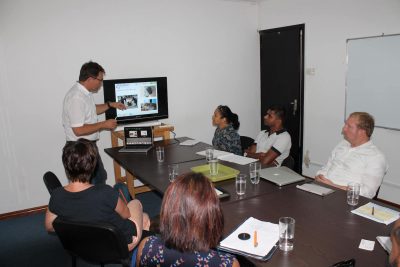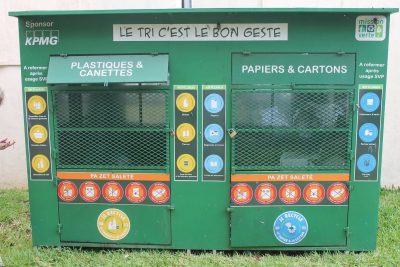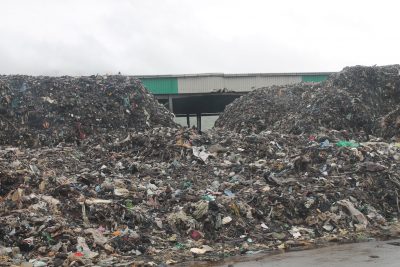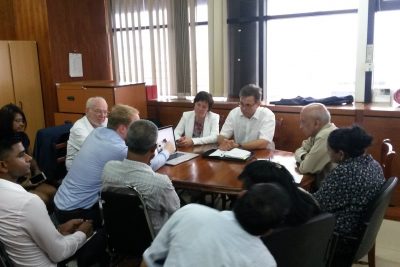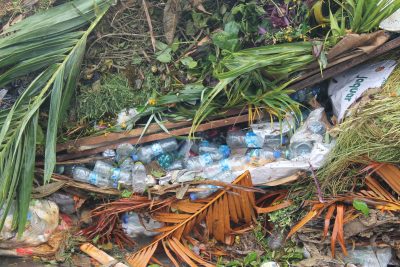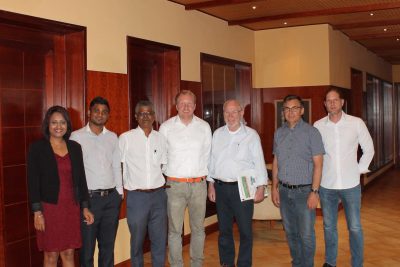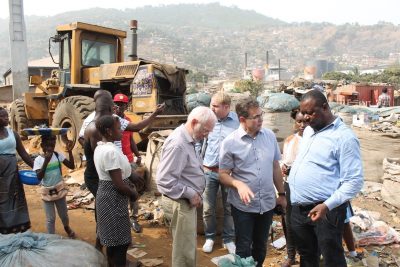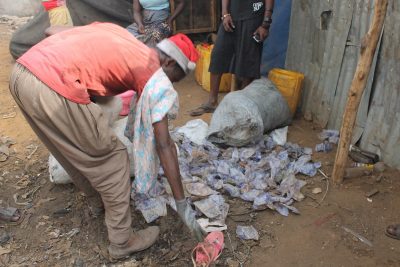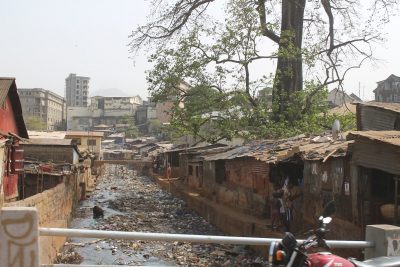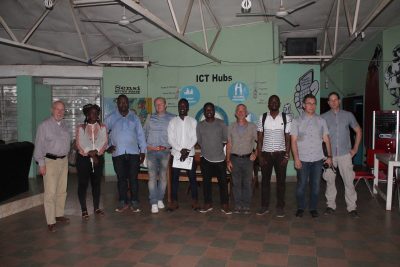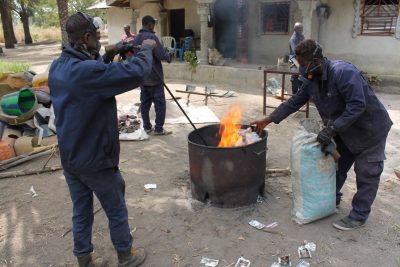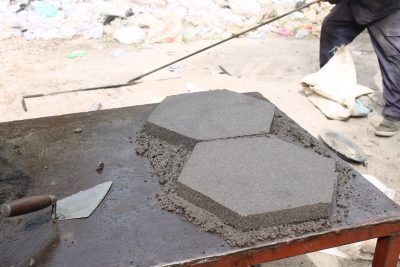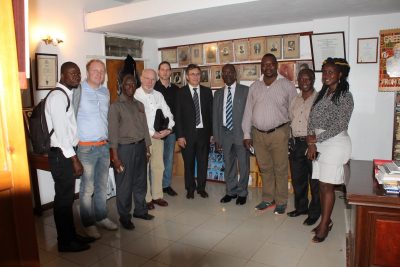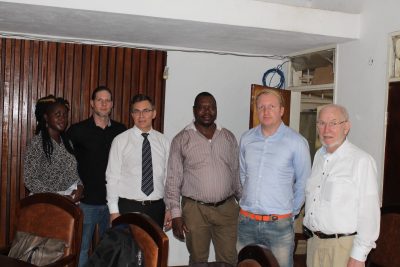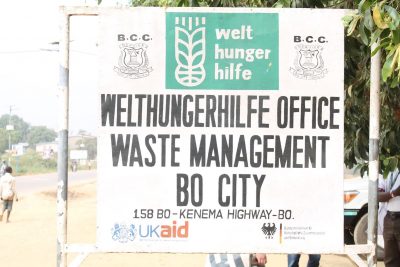KuWert
KuWert – Vessel-based treatment of plastics for the implementation of value chains in less developed countries and to avoid plastic input into the environment, particularly marine ecosystems
Project duration: August 2017 – December 2019
Hintergrund
Plastic waste endangers the environment, especially marine ecosystems, to a considerable extent. In 2014 alone, more than 300 million tons of plastic were produced worldwide. It is estimated that every year, roughly 10 million tons of this plastic end up in the ocean due to environmentally-unsound disposal systems. The problem is particularly serious in coastal areas, especially where no functional collection system for plastic waste exists.
Currently there is no method capable of decreasing the amount of plastic waste in the ocean in an economically and technologically feasible fashion; that means that the amount of plastics in the marine ecosystem is steadily increasing and will continue to grow in the upcoming decades. The amount of plastic waste entering marine ecosystems is largely dependent on the development of efficient waste collection and recycling systems.
Indeed a relevant reutilization system for plastic waste is lack in most less developed countries, also due to missing infrastructure and unstable political conditions. As a result, the value chains for the recovery of plastic waste are disrupted and valuable plastics are released into the environment. Particularly in coastal areas, this reusable waste is one of the main sources of plastic waste found in the ocean, which is a significant source of marine input.
Therefore, new solutions for reducing the input of plastics into the environment have to be developed…

Aims & Activities
The project aim is to develop a system to reduce the amount of plastic waste that enters the environment, particularly marine ecosystems, in less developed countries. This project will be comprised of a set of concepts and preliminary designs that detail the implementation of a waste collection infrastructure, as well as a vessel-based treatment system and a method of commercialization of plastic waste. The “KuWert” project proposed here systematically addresses the problem at its roots and prevents plastic waste from entering marine ecosystems.
From an economic perspective, the proposed system will close the value chains in the trade and recycling of plastic waste in less developed countries. The creation of opportunities for plastic waste commercialization will incentivize the removal of plastic waste from the environment, thereby encouraging collection of plastic waste from households and business enterprises. By closing value chains, this process could also create employment and income opportunities for low-skilled workers in these countries.
The successful implementation of the project could lead to an appreciable reduction in the amount of plastic waste contamination into marine ecosystems and the environment in less developed countries.
Objectives/ Main research
- Calculation of long-term projections of plastic waste quantities, in order to develop technical and economic designs for the plastic waste treatment plant.
- Determine the legal and socio-economic framework to be adhered to when developing a plastic waste collection, treatment, and recycling system in less developed countries.
- Develop the conception and preliminary designs for a vessel-based plastic waste treatment plant for the collection of plastic waste and the treatment and marketing of secondary plastics.
- Economic and ecologic assessment. Identification of the potential for reducing plastic waste inputs into the terrestrial and marine environment for less developed countries.
Main activities:
Basic evaluation
Evaluation of the situation in the target countries, taking into account specific local aspects. Estimation of the potential for long-term amount of plastic waste. The potential assessment will be carried out exemplary for the target countries Sierra Leone and Mauritius. For this purpose, universities from Sierra Leone and Mauritius are involved as partners in the project. In addition, a workshop will be held in the partner countries to evaluate the results and to network with players and stakeholders.
Pre-planning of a treatment and recycling plant
Assessment of treatment technologies and local conditions in the target countries. Design of a concept and pre-planning of treatment facilities for plastic waste.
Concept development (vessel and plant engineering)
Preparation of draft concepts for maritime carrier units taking into account interfaces, restrictions, energy requirements and operating costs.
Marketing potential of secondary raw materials
Market analysis and risk assessment on the recovery potential of plastics and development of a marketing concept.
Profitability analysis and life cycle assessment
Investigations on the economics of different treatment options and cost-benefit considerations. Evaluation of the ecological advantages of the variants in comparison with the current state.
Project partners

Institut für Energie und Kreislaufwirtschaft an der Hochschule Bremen GmbH, Germany
(Institute for Energy, Recycling and Environmental Protection at Bremen Universtiy of Applied Sciences)
Prof. Dr. rer.nat. Martin Wittmaier
Neustadtswall 30
28199 Bremen
GERMANY
Phone: +49 (0) 421 5905-2326
Fax: +49 (0) 421 5905-2380
E-mail: wittmaier@hs-bremen.de

Pruin Consult, Germany
Dipl.-Ing. Berend Pruin
Binnenfeld 17
21423 Winsen
GERMANY
Phone: +49 (0) 4179 7277
E-mail: berend.pruin@pruin-consult.de
Partner in the project funded by BMBF

TECHNOLOG services GmbH, Germany – Project coordinator
Dipl.-Ing. Fridtjof Rohde
Vorsetzen 50
20459 Hamburg
GERMANY
Phone: +49 (0) 40 707076-820
E-mail: fridtjof.rohde@tlg-services.biz

Institut für Energie und Kreislaufwirtschaft an der Hochschule Bremen GmbH, Germany
(Institute for Energy, Recycling and Environmental Protection at Bremen Universtiy of Applied Sciences)
Prof. Dr. rer.nat. Martin Wittmaier
Neustadtswall 30
28199 Bremen
GERMANY
Phone: +49 (0) 421 5905-2326
Fax: +49 (0) 421 5905-2380
E-mail: wittmaier@hs-bremen.de

Nehlsen AG, Germany
Dipl.-Ing. Hans-Dieter Wilcken
Nehlsen Stoffstrom GmbH & Co. KG
Wilhelm-Karmann-Str. 5
28237 Bremen
GERMANY
Phone: +49 (0) 421 84482-2000
E-mail: info@nehlsen.com
Cooperation partner

University of Mauritius, Mauritius
Dr. Arvinda Ragen
Reduit 80837
MAURITIUS
Phone: +230 403 7400
E-mail: centraladmin@uom.ac.mu
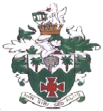
University of Sierra Leone, Fourah Bay College, Sierra Leone
Dr. Salieu Sankoh
Memo Street, Tower Hill
Freetown
SIERRA LEONE
Phone: +232 78 920590
E-mail: info@usl.edu.sl
Supporting companies

ALPLA Group, Germany
ALPLA is one of the leading companies for plastic packaging. Around 21,600 employees produce tailor-made packaging systems, bottles, closures and injection molded parts at 178 locations in 45 countries around the world.
ALPLA Werke Alwin Lehner GmbH & Co. KG
Allmendstraße 81
6971 Hard
AUSTRIA
Phone: +43 (5574) 6020
E-mail: office@alpla.com
Events
- Trip to West Africa (11/2019 – 12/2019)
Accra (Ghana), Banjul (Gambia), Dakar (Senegal), Abidjan (Ivory Coast)
- Trip to Sierra Leone (05/2019)
Freetown (Sierra Leone)
- Status conference of the BMBF research Programme (04/2019)
Berlin (Germany)
…continue reading – Link
- Workshop KuWert (01/2019)
Hamburg (Germany)
- SMM – Word’s leading exhibition for the marine industry (09/2018)
Exhibition Hamburg (Germany)
– Homepage – Link
- IFAT – World’s leading trade fair for water, sewage, waste and raw materials management (05/2018)
Exhibition Munich (Germany)
– Homepage – Link
- Workshop (03/2018)
Reduit (Mauritius)
- Workshop (01/2018)
Freetown (Sierra Leone)
- Kick-off Conference of the BMBF Research Programme (10/2017)
Berlin (Germany)
…continue reading – Link
Publications
- Press relase (04/2021) – ALPLA unterstützt schiffsgestützte Recyclinganlage (german) – pdf
- Press release (04/2021) – ALPLA supports ship-based recycling plant (english) – pdf
- Press release (04/2021) – ALPLA apporte une assistance au système de recyclage sur plate-forme navigante (french) – pdf
- Press release (11/2020) – Abgeordnete des Deutschen Bundestages informieren sich über das Vorhaben KuWert – eine sich selbst finanzierende Lösung gegen Plastik in der Umwelt (german) – pdf
- Press release (11/2020) – Members of the German Bundestag inform themselves about the Kuwert project – a self-financing solution against plastic in the environment (english) – pdf
- Press release (03/2020) – KuWert – Eine selbsfinanzierte Lösung gegen Plastik in der Umwelt mit vielfacher Nachhaltigkeit (german) – pdf
- Press release (03/2020) – KuWert – A self-financing solution against plastic in the environment with multiple sustainability (english) – pdf
- Press release (03/2020) – KuWert – Une solution d’autofinancement contre le plastique dans l’environnement avec une durabilite´ multiple (french) – pdf
- Press release (01/2018) – Fortschritte bei der schiffgestützten Behandlung von Kunststoffen zur Implementierung von Wertschöpfungsketten in wenig entwickelten Ländern (german) – Link
- Press release (01/2018) – Advances in vessel-based treatment of plastics for implementation of value chains in less developed countries (english) – pdf
- Press release (10/2017) – Müll-Beseitigung auf See und aus dem Meer (german) – pdf
Press release (10/2017) – Waste Disposal at and out of Sea (english) – pdf
- ERK Lüneburg-Uelzen (04/2021) – Klima- und Umweltschutz durch nachhaltiges Recyceln bei gleichzeitiger Minderung der Meeresverschmutzung (german) – pdf
- Weser Kurier (08/2019) – Serie Nachhaltigkeit: Die große Plastikflut – Warum es besser ist, Müll zu vermeiden (german) – Link
- Welt Wissen (08/2019) – Ist es wirklich sinnvoll, Plastiktüten zu verbieten? (german) – Link
- Technology Review (08/2019) – Fokus Plastik: Die Plastikfischer – Mit unterschiedlichen Methoden wollen Forscher und Umweltschützer die Plastikflut in die Meere dämmen. Alle sind nur Notlösungen, aber dennoch dringend notwendig (german) – Link
- Engels Kultur (07/2019) – Die Anlage muss zum Abfall kommen – Umweltexperte Martin Wittmaier über Müllvermeidung im Meer (german) – Link
- VSM – Schiffbau Industrie I/2019 (05/2019) – Plastik-Recycling vor der Küste Afrikas (german) – Link
- golem.de (05/2019) – Recycling – Die Plastikfischer (Ein Bericht von Daniel Hautmann) (german) – Link
- Global Times Newspaper Sierra Leone (01/2019) – Plans in Germany to Dispose Of Plastic Wastes in Sierra Leone (english) – pdf
- Verbandsnachrichten 51. Ausgabe – VSM (02/2018) – Fortschritte bei der schilfgestützten Behandlung von Kunststoffen (german) – Link
- Cleaner Seas (12/2017) – Waste Disposal at and out of sea (german) – Link
- TECHNOLOG (12/2017) – Newsletter (german) – Link
- TECHNOLOG (12/2017) – Newsletter (english) – Link
- Blickpunkt 10/2017 – VDMA (10/2017) – Müll-Beseitigung auf See und aus dem Meer (german) – pdf
- eREC – Digital Recycling Expo and Conference for Circular Economy and Waste Management (05/2021) – Plastik in der Umwelt – Strategien zur Reduzierung des Eintrags an Kunststoffabfällen in wenig entwickelten Ländern, ein Beispiel aus dem westlichen Afrika
- Hamburger Klimawoche (09/2019) – Perspektiven des Meeres- und Umweltschutz durch Recycling von Kunststoffabfällen am Beispiel der Küstenländer des westlichen Afrikas (german) – Link (YouTube)
- Maritime Woche Bremen (09/2019) – Perspektiven des Meeres- und Umweltschutzes durch Recycling von Kunststoffabfällen am Beispiel der Küstenländer des westlichen Afrikas
- Deutsche Welle – Made in Germany (08/2019) – Planet Plastik – das Problem mit dem Müll (german) – Link
- Das Hamburger Hafenkonzert: Hafennotizen (03/2019) – NDR 90,3 – Hamburger Hafenkonzert vom 17.03.2019
Förderung
The Project (FKZ: 033R196) is funded by the Federal Ministry of Education and Research (BMBF) as part of the research focus “Plastics in the Environment”.




Institut für Energie und Kreislaufwirtschaft an der Hochschule Bremen GmbH
Institute for Energy, Recycling and Environmental Protection at Bremen University of Applied Sciences
-
Neustadtswall 30
28199 Bremen
Germany - +49 421 5905-2326
- office-iekrw@hs-bremen.de

